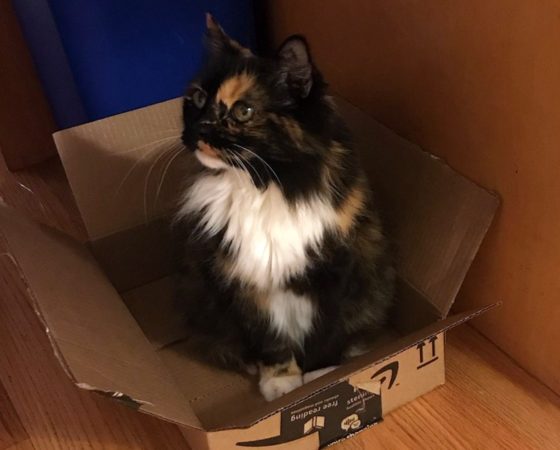As I write this, my 16-year-old cat Lily is sitting on the cushion beside me purring – but two weeks ago she nearly died.
Let me explain.
Lily went under anesthesia for a routine diagnostic procedure, and coming out of it, her heart stopped. The veterinarian performed CPR for 10 minutes and literally brought her back to life… but she couldn’t breathe, so they put an oxygen tube down her throat.
The veterinarian told us that fewer than 5% of pets who need CPR ever leave the hospital. As she lay there on her side in the ICU, I started to grieve. She had also suffered significant brain damage from the cardiac arrest. Over the next few days, she regained the ability to breathe but still appeared vegetative, lying on her side, unblinking.
She’s been home now for about a week. Her eyes are bright, but she’s blind (at least for now). She’s slowly relearning basic motor skills, like sitting up, walking, and grooming herself. Her progress is swift and miraculous, and I’m hopeful that she’ll continue to make amazing strides.
But while I was in the throes of ambiguity and uncertainty about whether she would ever leave the hospital, I learned a lot about grieving the loss of a pet.
What is pet grief?
Grief is the process of adjusting to a loss, and the experience of the emotions that accompany it. Elizabeth Kubler-Ross said that grief happens in 5 stages: denial, anger, bargaining, depression, and acceptance… but this isn’t linear or predictable, and grief looks different on everyone.
By that definition, even though Lily is alive and getting slowly better, I’m still grieving. I’m grieving the loss of a pet who used to meet me at the door when I got home, who could use the litter box on her own, who was relatively easy to take care of. I’m building a new normal, and while I’m infinitely grateful that she overcame such difficult odds, it’s a huge, difficult adjustment.
Culturally, we assign different amounts of value to different kinds of grief. If you lose a person, you’re allowed to feel sad for a long period of time. But if you lose a pet, a lot of people in your life may not consider that a valid reason to go through a grief process. You may be embarrassed to ask for a day off work to process the changes in your life. People may suggest that you go to a shelter and get a new pet right away.
But you are allowed to grieve the loss of a pet. It’s heartbreaking, and a damn hard adjustment. Here’s what I didn’t understand two weeks ago about pet grief that I’ve recently learned.
Your pet is part of the bedrock of your life.
While Lily was in the hospital, I frequently found myself driving towards home, picturing her walking towards the door as I entered the house. I think I’ve probably had that image in my mind most times I’ve headed home for the last 14 years, but it elicited a warmth I associated with the general idea of “home”. I didn’t realize how tied it was to my pet until there was an incongruity.
When you’ve had a pet for a long time, you don’t even realize how much they’re woven into the fabric of your everyday. You rearrange little parts of your life around them, and those little parts of your life become your new routine.
If you lose your pet, you have to revisit those parts of your routine that you’d come to take for granted. You see the loss in every corner of your home, and perhaps beyond. You have to establish a new normal, and every bit of that can take an emotional toll.
One morning last week, I woke up and thought, “I’m going to get up and make myself a bowl of cereal.” Whenever I make cereal, Lily runs over from her part of the house and meows, knowing that the milk dregs at the bottom of the bowl are hers for the claiming. It made me sad… so I made eggs instead.
Pets can be symbolic of other things in your life.
I’ve had Lily since college, for 14 years. When I picked her up from the shelter, I was barely an adult. She’s seen me through every adult relationship I’ve ever had, through cross-country moves, career changes, celebrations, losses, and every other significant experience since I was 20 years old. In a life that’s been through a lot of changes, she has been a rare point of stability.
So what does it mean if she’s gone?
Beyond loving your pet for being a simple, loving bundle of joy, they may also symbolize something to you. For some people, it’s feeling that their pet is a safe haven in a world where it’s hard to be vulnerable. For others, the pet may be associated with a deceased or estranged friend or family member. And some people may connect their pet with a happier time in their life, or the ability to overcome challenges.
When you’re grieving your pet, you’re also grieving what your pet has come to mean in your life.
You may cry, a lot.
And this is okay. Your feelings are okay. You’re not overreacting, and you don’t need to feel apologetic or ashamed.
Allow space for this transition to be hard, and be kind to yourself.
